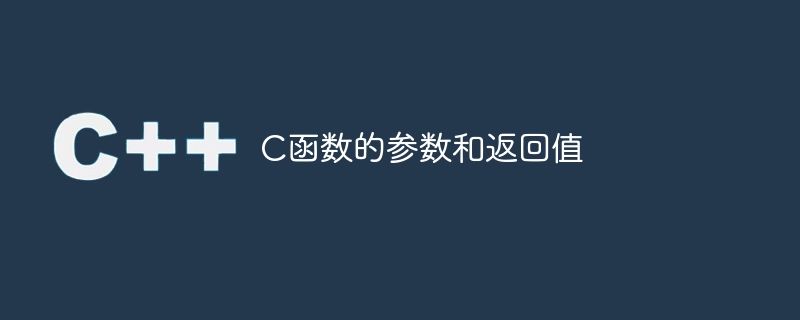Home >Backend Development >C++ >C function parameters and return values
C function parameters and return values
- 王林forward
- 2023-08-27 17:49:06868browse

Here we will see the different types of C functions based on return values and parameters.
Therefore, a function can take some parameters, or not take any parameters. Likewise, a function can return something and otherwise return nothing. Therefore, we can classify them into four types.
- A function with no parameters and no return type.
- A function that has no parameters but returns something.
- A function that takes parameters but returns nothing.
- A function that takes parameters and returns something.
Example
#include <stdio.h>
void my_function() {
printf("This is a function that takes no argument, and returns nothing.");
}
main() {
my_function();
}Output
This is a function that takes no argument, and returns nothing.
This function does not accept any input parameters, and the return type is void. Therefore, it returns nothing.
Example
#include <stdio.h>
int my_function() {
printf("This function takes no argument, But returns 50</p><p>");
return 50;
}
main() {
int x;
x = my_function();
printf("Returned Value: %d", x);
}Output
This function takes no argument, But returns 50 Returned Value: 50
Here this function is not taking any input argument, but its return type is int. So this returns a value.
Example
#include <stdio.h>
void my_function(int x) {
printf("This function is taking %d as argument, but returns nothing", x);
return 50;
}
main() {
int x;
x = 10;
my_function(x);
}Output
This function is taking 10 as argument, but returns nothing
This function accepts an input parameter, but its return type is void. So it returns nothing.
Example
#include <stdio.h>
int my_function(int x) {
printf("This will take an argument, and will return its squared value</p><p>");
return x * x;
}
main() {
int x, res;
x = 12;
res = my_function(12);
printf("Returned Value: %d", res);
}Output
This function is taking 10 as argument, but returns nothing
The function here accepts any input parameter and returns a value.
The above is the detailed content of C function parameters and return values. For more information, please follow other related articles on the PHP Chinese website!

